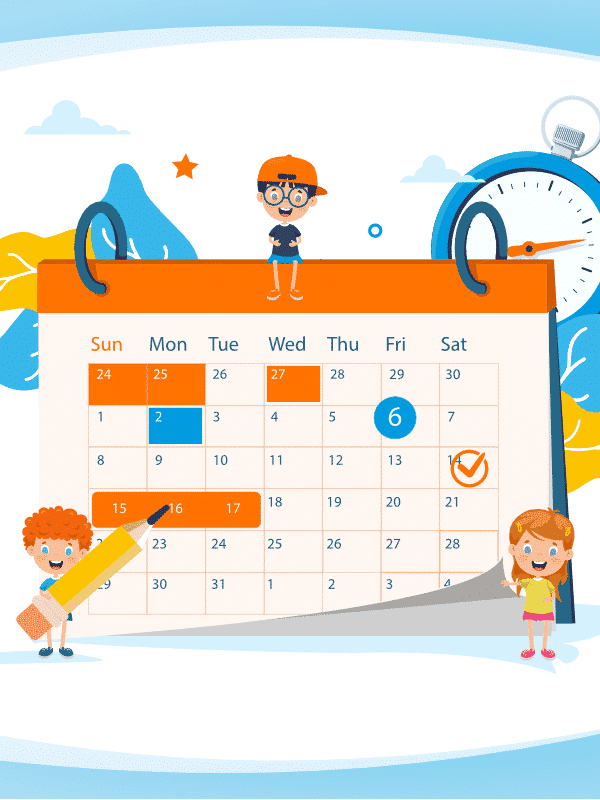One of the most important topics for kids learning Spanish to know are synonyms and antonyms. Why? Well, it’s important they have a wide vocabulary so they can express all their feelings, ideas and situations they go through properly. And synonyms and antonyms will give them this type of diverse vocabulary.
On this blog, we decided to focus on Spanish synonyms for kids. Believe us, your kids will need these synonyms to speak to their Hispanic friends, because they’re very common.
Plus, imagine your kids are having a conversation in Spanish and they keep using the same words to express themselves. It can get a bit repetitive. But if they know some synonyms for what they want to say the conversation will go more fluently and they’ll impress everyone.
Though some words have similar meanings and therefore can be used in the same situations, they also have small nuances between them. Your children will also learn this by learning synonyms. And so they’ll be able to express what they’re truly feeling and what they truly want more properly through the details of each word.
Synonyms in Spanish – What’s a Synonym?
A synonym is a word or a phrase that has the exact same meaning or one that’s at least very similar to another one. Like in English “small” and “little”. Or “end” and “finish”.
By the way, in Spanish it’s “sinónimo”.
1. Idioma (language)
Synonym:
- Lengua (language)
For example:
- El español es mi segundo idioma. (Spanish is my second language).
- El español es mi segunda lengua.
2. Hablar (to speak / to talk)
Synonyms:
- Charlar (to chat)
- Conversar (to talk / to converse)
For example:
- Voy a hablar con mi amigo sobre su nuevo perro. (I’m going to speak with my friend about his new dog).
- Voy a charlar con mi amigo sobre su nuevo perro.
- Voy a conversar con mi amigo sobre su nuevo perro.
3. Feliz (happy)
Synonyms:
- Contento (happy / glad)
- Alegre (cheerful)
For example:
- Estoy feliz de verte. (I’m happy to see you).
- Estoy contento de verte.
- Estoy alegre de verte.
4. Triste (sad)
Synonyms:
- Decaído (down / discouraged)
- Entristecido (saddened.)
- Abatido (down)
- Afligido (afflicted)
- Desanimado (discouraged)
For example:
- Mi hermana se siente triste. (My sister feels sad).
- Mi hermana se siente decaída.
- Mi hermana se siente entristecida.
- Mi hermana se siente abatida.
- Mi hermana se siente afligida.
- Mi hermana se siente desanimada.
5. Bonito (pretty)
Synonyms:
- Bello (beautiful)
- Hermoso (beautiful)
- Precioso (precious)
- Lindo (nice)
For example:
- Los atardeceres son bonitos. (Sunsets are pretty).
- Los atardeceres son hermosos.
- Los atardeceres son preciosos.
- Los atardeceres son lindos.
6. Feo (Ugly/horrible)
Synonyms:
- Horroroso (awful)
- Horrible (horrible)
- Desagradable (unpleasant)
For example:
- ¡Iugh! Algo aquí huele feo. (Ugh! Something in here smells horrible).
- ¡Iugh! Algo aquí huele horroroso.
- ¡Iugh! Algo aquí huele horrible.
- ¡Iugh! Algo aquí huele desagradable.
7. Pequeño (little)
Synonym:
- Chico (small)
For example:
- Mi cuarto es muy pequeño. (My room is very small).
- Mi cuarto es muy chico.
8. Rápido (Fast)
Synonym:
- Veloz (fast)
For example:
- El internet de mi computadora es muy rápido. (The Internet on my computer is very fast).
- El internet de mi computadora es muy veloz.
9. Automóvil (automobile)
Synonyms:
- Auto (auto)
- Coche (car)
- Carro (car)
For example:
- Cuando sea grande me voy a comprar un automóvil rojo metálico. (When I grow up, I’m going to buy myself a metal red automobile).
- Cuando sea grande me voy a comprar un auto rojo metálico.
- Cuando sea grande me voy a comprar un coche rojo metálico.
- Cuando sea grande me voy a comprar un carro rojo metálico.
10. Anteojos (glasses)
Synonyms:
- Lentes (glasses)
- Gafas (glasses)
For example:
- Mi abuelita perdió sus anteojos. (My grandma lost her glasses).
- Mi abuelita perdió sus lentes.
- Mi abuelita perdió sus gafas.
11. Pelota (ball)
Synonym:
- Balón (ball)
For example:
- ¡Pásame la pelota! (Pass me the ball!)
- ¡Pásame el balón!
12. Bañarse (to shower)
Synonyms:
- Ducharse (to take a shower)
- Asearse (to wash yourself)
For example:
- Ya es tarde, ve a bañarte, por favor. (It’s already late, go shower, please).
- Ya es tarde, ve a ducharte, por favor.
- Ya es tarde, ve a asearte, por favor.
13. Sombrilla (umbrella)
Synonyms:
- Paraguas (umbrella)
- Quitaguas (umbrella)
- Parasol (umbrella)
- Quitasol (sunshade)
- Guardasol (sunshade)
For example:
- ¡Ay, no! Se rompió mi sombrilla. (Oh no! My umbrella broke).
- ¡Ay, no! Se rompió mi paraguas.
- ¡Ay, no! Se rompió mi quitaguas.
- ¡Ay, no! Se rompió mi parasol.
- ¡Ay, no! Se rompió mi quitasol.
- ¡Ay, no! Se rompió mi guardasol.
14. Mucho (much)
Synonyms:
- Demasiado (too much)
- Abundante (abundant)
For example:
- ¡Hace mucho calor! (It’s too hot!)
- ¡Hace demasiado calor!
- ¡Hace abundante calor!
15. Sí (yes)
Synonyms:
- Así es (that’s right).
- Correcto (right)
- Claro (of course)
- Por supuesto (Of course)
For example:
- ¿Te gusta ir a la escuela, verdad? Sí. (You like going to school, right? Yes).
- ¿Te gusta ir a la escuela, verdad? Así es.
- ¿Te gusta ir a la escuela, verdad? Correcto.
- ¿Te gusta ir a la escuela, verdad? Claro.
- ¿Te gusta ir a la escuela, verdad? Por supuesto.
16. Tomar (to drink)
Synonym:
- Beber (to drink)
For example:
- Tienes que tomar agua para estar saludable. (You have to drink water to be healthy).
- Tienes que beber agua para estar saludable.
17. Gustar (to like)
Synonyms:
- Agradar (to like / to please)
- Encantar (to love)
For example:
- Te prometo que te va a gustar la película. (I promise you’re going to like the movie).
- Te prometo que te va a agradar la película.
- Te prometo que te va a encantar la película.
18. Terminar (to finish)
Synonyms:
- Acabar (to end)
- Finalizar (to finalize)
- Concluir (to conclude)
- Completar (to complete)
- Finiquitar (to finalize)
- Consumar (to consummate)
For example:
- A ella le gusta terminar todos los proyectos que empieza. (She likes to finish all the projects she starts).
- A ella le gusta acabar todos los proyectos que empieza.
- A ella le gusta finalizar todos los proyectos que empieza.
- A ella le gusta concluir todos los proyectos que empieza.
- A ella le gusta completar todos los proyectos que empieza.
- A ella le gusta finiquitar todos los proyectos que empieza.
- A ella le gusta consumar todos los proyectos que empieza.
19. Flaco (skinny)
Synonyms:
- Delgado (thin)
- Esbelto (slim / slender)
For example:
- Mi perro es muy flaco, necesito alimentarlo más. (My dog is very skinny; I need to feed him more).
- Mi perro es muy delgado, necesito alimentarlo más.
- Mi perro es muy esbelto, necesito alimentarlo más.
20. Fácil (easy)
Synonyms:
- Sencillo (simple)
- Simple (simple)
For example:
- Aprender sinónimos es muy fácil. (Learning synonyms is very easy)
- Aprender sinónimos es muy sencillo.
- Aprender sinónimos es muy simple.
Diversify Your Kids Spanish Vocabulary with TruFluency Kids
This list of Spanish synonyms is just a small taste of everything Trufluency Kids can offer you. You want your kids to keep expanding their vocabulary? Take a look at our “animals in Spanish” blog. Or at our blog about scary feelings in Spanish.
They also can’t miss learning about Spanish homophones in one of our articles. But wait, there’s more than just blogs. We also offer Spanish immersion classes!
TruFluency Kids Spanish classes are based on our very own Bellieu Method. It consists of speaking to practice everything you’ve learned. This is the only way your kids can achieve Spanish fluency.
We also have native teachers. How cool is that, huh? They will make sure everything the students learn is useful for a real-life situation. This means they’ll keep learning helpful and diverse vocabulary. But they’ll also improve their grammar, listening and reading skills.
Oh, and of course everything is taught in a fun way. There’ll be Spanish singing, crafting and playing games during our classes!
You can take a trial class! They’re live and small classes, with a maximum of five students per class. So everything is more personalized. You can choose to take them on Tuesday, Wednesday or Thursday at 5 p.m. Or on Saturday at 1, 2, or 3 p.m. (CT). Even better: after the class, there’s a Q&A for parents to ask all their doubts.
¡Así es, nuestras clases pondrán a tus niños alegres! So wait no more and start now.


